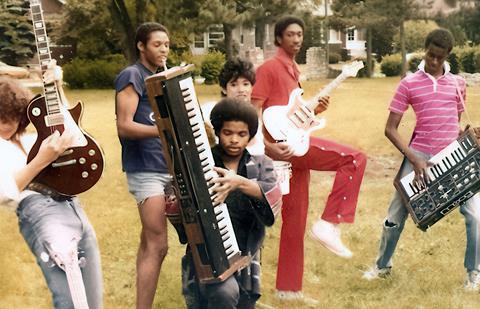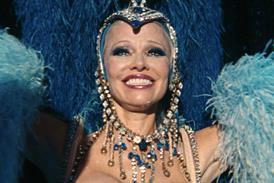The Chicago originators of house music step up to the lens at last

Dir: Elegance Bratton. US. 2025. 92mins
House music, the underground sound that rose from the ashes of disco in the late 1970s, receives a loving tribute in Move Ya Body, a documentary that celebrates its origins while lamenting the forces which kept its creators from capitalising on the genre’s eventual crossover success. Director Elegance Bratton speaks to those in the Chicago scene who were pivotal in birthing the music — primarily, Black and queer artists looking for a safe space to dance. But like so many previous eras of American pop music, the story of house is also one of appropriation and exploitation as a vital outsider style was subsumed into the mainstream, the originators largely forgotten.
Warm reminiscences are always laced with cultural commentary
Move Ya Body’s crowd-pleasing vibe should play well at Sundance, where the documentary premieres. This is the follow-up film from Bratton, whose 2022 feature debut The Inspection earned lead actor Jeremy Pope a Golden Globe nomination. (Bratton’s 2019 documentary Pier Kids, about homeless queer and trans New York youths, premiered at Outfest.) The enduring popularity of house music should boost interest in this picture, especially among Chicago viewers, although as Move Ya Body explains, the genre has long since become a global sensation.
In mid-1970s America, disco was establishing a foothold on the charts, threatening rock’s cultural dominance. But because the musical style was often the provenance of Black, queer and female acts, a vocal backlash quickly emerged with clear bigoted undertones. (Infamously, during the summer of 1979, outrageous Chicago rock DJ Steve Dahl organised a Disco Demolition Night at Comiskey Park, in which thousands of disco records were ceremoniously detonated in the middle of the baseball diamond.) As a result, disco lovers like future producer Vince Lawrence, a nerdy Black youth hoping to become a musician, went underground, frequenting warehouse clubs where a new, more propulsive and minimalist strain of disco, dubbed house, germinated.
Bratton’s nostalgic film features talking heads such as Lawrence recalling house’s early days. Archival footage is mixed with dramatisations of Lawrence’s youth — Malik Shakur plays the record producer as an adolescent — but the warm reminiscences are always laced with cultural commentary. From the start, house was a music of defiance and solace, offering marginalised listeners an outlet to be themselves without fear of judgment or reprisals. (Move Ya Body is clear-eyed about Chicago’s segregated neighborhoods and the dangers Black individuals faced if they accidentally walked down the wrong street.) While the songs’ lyrics didn’t necessarily speak to issues of racial or sexual identity, the booming beats and ecstatic musical release nevertheless conveyed the sense of liberation that powered this inclusive scene.
Fans of musical history will enjoy Move Ya Body’s recounting of how disco’s commercial decline in the late 1970s actually helped spawn two significant movements: house and hip-hop, both of which took inspiration from disco’s danceable rhythms. (Although, as one female subject notes, these two musical descendants started off very differently, with hip-hop initially catering to a more misogynistic audience.)
Inevitably, house’s initial excitement and creativity gave way to infighting and interlopers, with vulture-like entrepreneurs such as businessman Larry Sherman swooping in with promises of bringing the music to the masses. Bratton does not pull punches in suggesting that it was white artists and promoters — some, like rock singer Rachael Cain, who despised disco — that took advantage of naive house musicians, gobbling up their songwriting credits and royalties, and leaving some of those creatives in dire financial straits.
House may be known for its energetic sound, but its journey from the Chicago warehouses to the world stage was often bittersweet. Move Ya Body chronicles how the genre was homogenised as it was transformed into more popular styles like EDM. To that end, the documentary draws a welcome connection between the appropriation of house by superstar DJs such as David Guetta, and previous American Black music, like the blues and rock ‘n’ roll, that were embraced by mainstream audiences once white acts latched onto those sounds. House found widespread acceptance, but only after it lost its connection to its Black, queer and female roots.
Move Ya Body saves some of its cruelest twists for its final section, revealing what happened to some of its subjects. Contemporary artists like Beyonce have worked to honour the architects of house, hiring them as producers on their albums, but Bratton believes these bygone producers and DJs still deserve their due. The documentary’s dramatic recreations often come across as stagy, but having individuals like Lawrence speak their truth in their own words is affecting enough. They just wanted a place to make the music they loved — decades later, they are still spoiling to be heard.
Production companies: Freedom Principle, One Story Up, HiddenLight
International sales: WME, Maggie Pisacane, Mpisacane@wmeagency.com / Ryan McNeily, rmcneily@wmeagency.com
Producers: Chester Algernal Gordon, Elegance Bratton
Cinematography: Lisa Rinzler
Production design: Tommy Love
Editing: Kristan Sprague, Jeremy Stulberg
Music: James Newberry
























